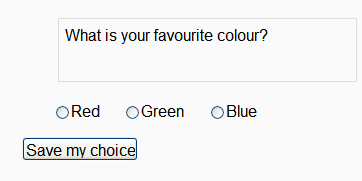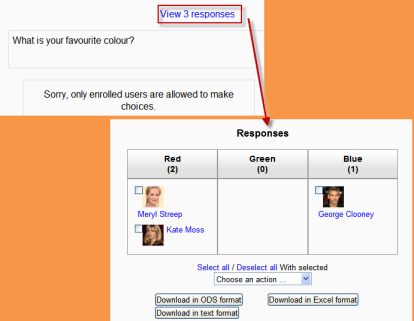Using Choice
What the student sees
- When a teacher has created a Choice activity, the student is presented with a number of radio buttons. They click one to make their selection.
- Depending on the teacher's settings, the student may then be able to see the results either anonymously or with names (via the "View xxx responses" link) or not see anything.
What the teacher sees
- Regardless of how it's been set for students, a teacher will always see user names and choices, via the "View xxx responses" link.
- The teacher is also able to delete selected choices or download them in various formats as in the screenshot below:
Some ways to use Choice
Thinking about existing knowledge
Pedagogically, the choice activity can be used to provide an opportunity to share starting points through which learners are encouraged to think about and articulate existing knowledge and understandings of a topic. For example, you can ask students to make ‘choices’ about a statement such as “in learning to become a teacher, the most significant issue for me is” (giving the following choices): trust, theoretical underpinnings, communication or delivering materials to students.
This has two benefits: firstly, it forces participants to engage with their choice and think, in advance of a further related activity (you might wish to follow up such a choice activity with a forum discussion or a reflective activity like the online text assignment), about the context and consequences of this choice. Secondly, it allows tutors and students to gain a better understanding of existing views/understandings/knowledge related to the question, idea or concept at hand in the Choice activity.
Assessing understanding
For younger students, the choice activity is a secure way to gauge their understanding of a topic without asking them in public: with a question such as "how well did you understand this module?" students can honestly select from "very well", "OK" or "I stil don't get it", safe in the knowledge only their teacher knows their response and they will not be shamed in front of their peers.
The choice activity in Moodle only allows a participant to select one choice from a variety of options (that you provide), but you may set the activity so that participants can change their choices - thus, as students make progress and gain confidence, they might want to update their choice to reflect this. You can also set the activity so that it ‘closes’ or ‘locks down’ on a specific date, making all choices final from that point on. This allows participants to change their minds several times before a final date.
Selecting groups
Using the choice activity is one way of getting students to put themselves into groups. However in its standard form, it does not add them to the gradebook as a group. There is a contributed module that does this here: Choicegroup
Examples of using choice
The following examples are mostly taken from a Using Moodle forum discussion Creative Uses?.
Gather pre-event comments
- A simple question to answer, to kick start - the beginning of a lesson.
- Gather initial comments, reasons for taking course, participating in event
Every spring, our school sends 180 students and our fine arts faculty to a 3 or 4 day event. Students invited to participate are enrolled in a Moodle course for the event.
We use the new forum to communicate with students. The forum is open to anyone, so parents can read it, too.
We use the choice module to gather the initial commitment from students to attend, and then later their their bus choices and hotel roommates. In years that the bus rides are long enough, students pre-select boxed meals.
I modified the Choice module to allow me to easily make selections for students who do not respond in a timely manner.
We also use the feedback module to gather student cell phone numbers, a list of events that each student will attend, and t-shirt requests.
I wrote a PHP program to gather all of this info and create an Excel file with all of the info in various arrangements.
Memo tracking
I have made some minor changes to the Choice code (only requiring one "choice") so that we in the Business world can use the Choice module for Memo tracking.
Each Memo is a new Choice, the memo is entered, and the choice is "I have read and understand this memo". Then our Managers can track who has or has not read the memo, and follow up with those who have not read them.
Feedback from students about course or activity
A question left unanswered from a lesson - that needs an answer. Now home study. As feedback about a lesson, as assessment for learning.
Polling tool
As they are so fast to set up - they can even be used as a polling tool, although there are other tools out there. A colleague used them for student voice polling.
Registrar and Administration uses
Currently Moodle Choices is offering a far greater contribution to our admin functions than our teaching.(remember not to use groups in this function)
Elective courses: students are given a list of choices that they can choose from.
Sign up for an activity
Sign up for a specific activity eg Rosetta Stone, cycle rental - Students self-enrol to a moodle coursepage then click to say 'please sign me up' - we use choices in order to set course limits
Student confirm pathways
Choice of degree specialism - students are away on stage, and change their mind frequently, so we set a choices activity with the pathways and instead of emailing us every time they change their minds, they indicate the change on choices, which are left open.
Use with podcasts and videos
Include podcasts or videos as well as images in the choice activity.
Elections
It is possible to run student union elections using choice module.
See also
Working example of a choice activity from School demo site. Log in with username "student" and password "moodle" and enrol yourself into the course to make your choice and see others' responses.
- Choice module video (older version of Moodle)
Using Moodle forum discussions:

